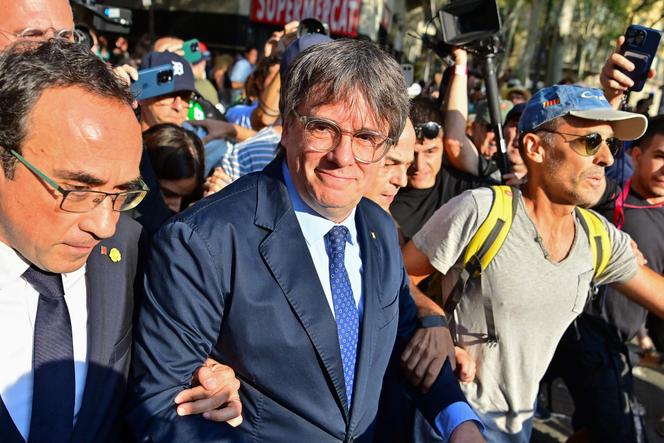


The investiture vote of Socialist Salvador Illa as head of the Generalitat, the government of the autonomous region of Catalonia, on Thursday, August 8, was supposed to usher in a return to a form of stability and institutional reconciliation with Spain, after 14 years of pro-independence governments in Barcelona. Yet the occasion was overshadowed by the latest stunt by Carles Puigdemont, the former regional government leader behind the illegal October 1, 2017 independence referendum, who seemed eager to once again thumb his nose at the Spanish justice system, which has been tracking him down for seven years. Puigdemont moved to Belgium to escape.
Having willingly come to Barcelona as a regional MP, the former president of Catalonia's Generalitat fooled the police, who had orders to arrest him under a warrant for "aggravated misuse of public funds" linked to the expenses of organizing the banned 2017 referendum. By Friday, he was still nowhere to be found, despite a vast police presence being deployed to apprehend him. During the day, two agents of the Mossos d'Esquadra, the Catalan regional police force, were arrested for helping him to escape. His JxCAT party told Catalan radio on Friday that the leader had, once again, left for Belgium.
At 9 am on Thursday, Puigdemont first made a mockery of the police presence by appearing out of nowhere, on foot, in a small street in the El Born district, before quickly being surrounded by a crowd of pro-independence supporters who walked alongside him for the few dozen meters that separated him from the triumphal arch close to the regional Parliament. Risking arrest, Puigdemont had announced, the day before that he would keep his promise, made during the Catalan elections in May, to attend the opening session of the new legislative term, and that he would take part in an "institutional event" near Parliament.
From a podium, Puigdemont delivered a six-minute speech: "I've come to remind you that we're still here, and that we don't have the right to renounce the right to self-determination of the Catalan people," he said to the 4,000 or so people who had responded to the call issued by what remains of the organized pro-independence movement in Catalonia, notably the Catalan National Assembly and Òmnium Cultural associations. "Today, many were hoping to celebrate my arrest," he continued. "I don't know how long it will be before we see each other again, but whatever happens, when we do, we'll be able to shout together: 'Long live a free Catalonia!'"
You have 55.68% of this article left to read. The rest is for subscribers only.
